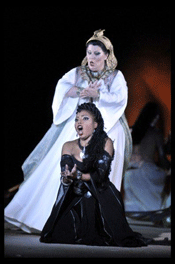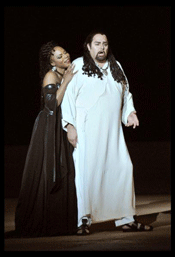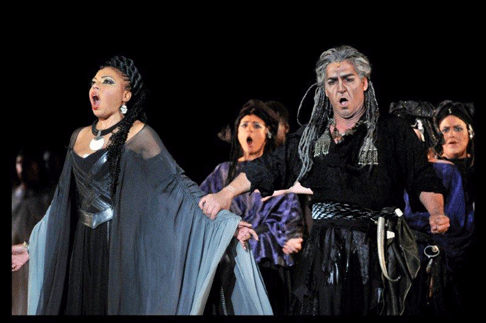Then it was Opera at Masada, where
Verdi’s Nabucco was performed in a mammoth new open-air theater
set between the mountain central to Jewish identify and the Dead Sea. A recital
by Jesse Norman was included in the season.
This year it was the Masada Dead Sea and Jerusalem Opera Festival Six
performances of Verdi’s Aida were set for at Masada, while
Verdi’s rarely performed Jerusalem, a revision of his I
Lombardi, was staged at Sultan’s Pool, once a reservoir in
Jerusalem’s historic water system. This was also a season of
collaborations that contributed greatly to plans by Israel Opera’s
inventive general director Hanna Munitz to make this a destination festival on
a level with long established programs in Europe.
Special this year was the Masada performance of Verdi’s Missa da
Requiem by orchestra and soloists from Arena di Verona, the Italian
festival that reaches back to 1913. In the performance the opened the season on
June 3 Giuliano Carella conducted the Verona forces, plus the Israel Opera
Chorus and Tel Aviv Philharmonic Choir. The Verona guests further offered an
evening of opera’s greatest hits at Sultan’s Pool, attended by 5000
enthusiastic fans. Star of that show was internationally celebrated tenor
Setfano Secco in such favorites as “Nessun dorma” and “E
lucevan le stelle.” Carella made the evening a success despite a sound
system unfair to the instrumentalists involved.

Once the fireworks of the Triumphal March were out of the way,
Aida, seen on June 5, seemed a work not terribly well suited to the
vastness of Masada. In the essential duet that results in Aida’s
confession of her love for Radames, Aida and Amneris seemed lost in the desert
night and without the dramatic personal confrontation that sets the scene for
the rest of the story.
Happily, things improved after intermission when China’s Hui He made
her entrance on a camel. And it was He who earned high marks for her work in
the title role. A former IO Tosca, He was a strong but gently female
Aida whose love grew ever greater when challenged.
Of course, it’s hard to avoid the feeling that Verdi stacked the cards
against Egyptian Princess Amneris, who has little chance of winning the
sympathy of an audience. Amneris is primarily a public person, never intended
to be passion’s plaything. In the role Hungarian-born mezzo Ildiko
Komlosi was a regal presence, conscious of her role in the conflict between
public and personal feelings. Yet it was clear that she had no choice in
setting the events that would lead to Radames’ death in motion.

Although in appearance hardly a dream Radames Pierre Giuliacci, a familiar
figure at European festivals was equally heroic and sensuous as Radames.
Veteran bass Paata Burchuladze brought dignity to High Priest Ramfis. Born is a
Georgia then part of the Soviet Union, Burchuladze has been an Israel favorite
since he sang the title role in the Boris Godunov that opened the
opera house in Tel Aviv in 1995. (Thus Israelis overlook an increasingly wide
vibrato that is irritating to non-fans.) Italy’s Roberto Frontali made
his IO debut as a movingly human Egyptian King Amonasro.
The staging, directed by Charles Roubaud, was largely straightforward. Sets
by Emmanuelle Favre were minimal — four sphinxes and a huge royal statue
— and wisely made no effort to compete with impressive natural
surroundings. Costume designer Denise Dufolt appeared to have found a bargain
in white cotton, the dominant material in mob scenes, but unflattering to the
full figure of Giulliaci.
Especially effective were projections onto Masada Mountain designed by
Nicolas Topor. The production added a bit of local color by including residents
of a local Bedouin village in lieu of a dance ensemble. Daniel Oren conducted
the IO Orchestra Rishon LeZion.
The sound system failed for a moment late in the production, stressing that
technology is never totally reliable. Nonetheless, this was all in all a
successful, if not memorable Aida, but as entertainment no match for the
exuberance of the 2010 Nabucco, which reached its high point when
conductor Daniel Oren conducted the audience in a “community sing”
repeat of the famous chorus “Va, pensiero.” Aida does not invite
such audience participation.

Aida was a co-production with Les Choragies d’Orange and will be
staged at the Roman Theatre in Orange.
The current season concluded with a Masada concert by Italian tenor Andrea
Bocelli on June 12. In a further expansion of the season, 30 chamber concerts
were performed in Jerusalem at places of worship and historic sites in the city.
Bizet’s Carmen has been announced as the major opera of the
festival’s 2012 season.
While European cultural capitals have their castles and cathedrals Israel
offers the visitor over 2000 years of — often tormented — history.
Even so, archeological activity continues at break-neck speed.
Israel is a small and easily manageable land. Tel Aviv and Jerusalem, its
major cities, are an hour apart, and the drop from Jerusalem to the Dead Sea is
approximately that distance. Where but in Israel can one float in the Dead Sea,
have dinner and head for an opera at Masada all in one afternoon?
Wes Blomster
image=http://www.operatoday.com/Aida_Israel_01.gif
image_description=Aida Israel Opera [Photo by Yossi Zwecker]
product=yes
product_title=Verdi: Aida
product_by=Ramfis: Paata Burchuladze; Radames: Pierre Giulliaci; Amneris: Ildiko Komlosi; Aida: Hui He; King of Egypt: Carlo Striuli; Messenger: Yosef Aridan; Amonasro: Roberto Frontali; High Priestess: Efrat Ashkenazi. Conductor: Daniel Oren; Director: Charles Roubaud; Set Designer: Emmanuelle Favre; Costume Designer: Denise Dufolt; Lighting: Avi Yona Bueno; Choreography: Jean-Charles Gil; Video Designer: Nicolas Topor. Israel Opera: Open-air Theater at Masada, June 5, 2011.
product_id=All photos by Yossi Zwecker courtesy of Israel Opera